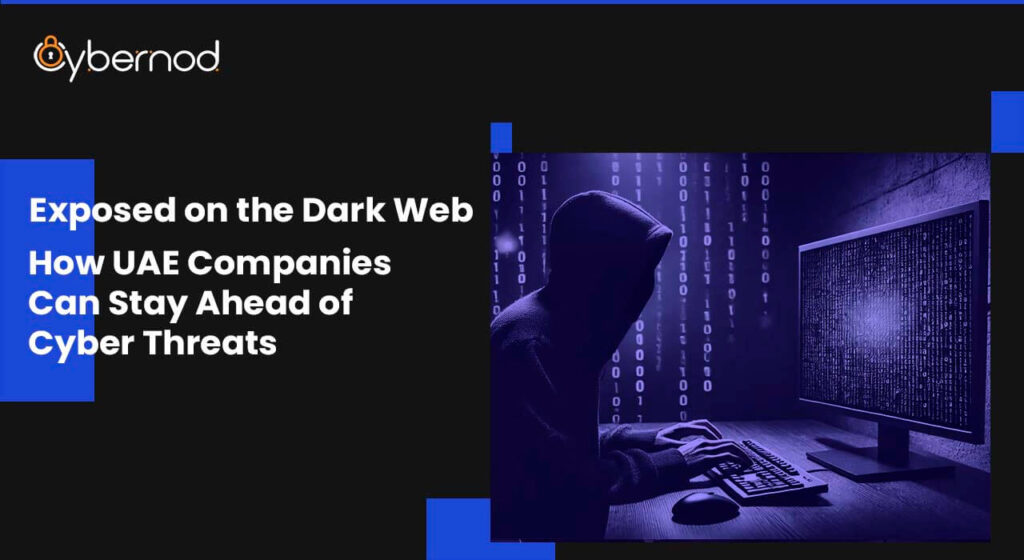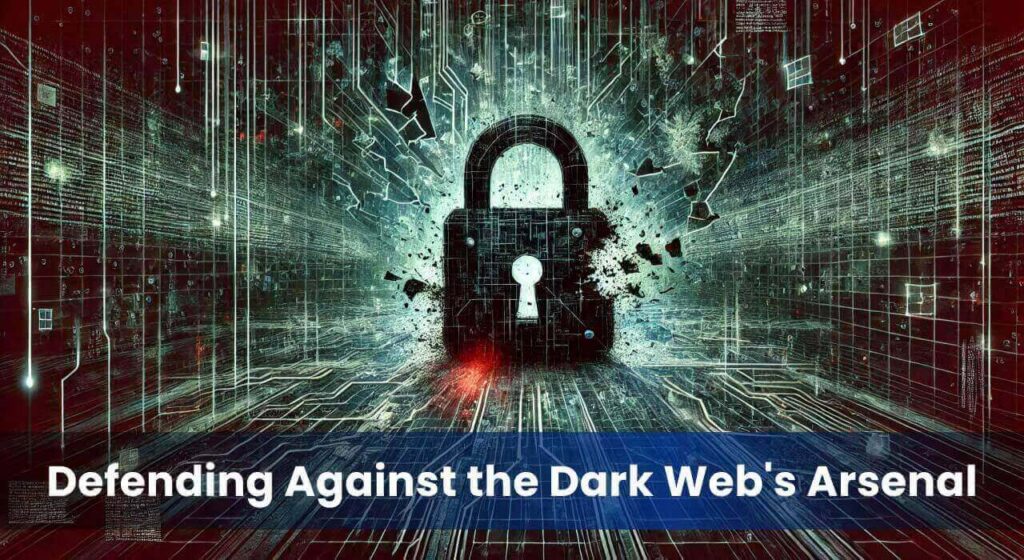
The dark web, a hidden part of the internet where anonymity thrives, has become a haven for cybercriminals seeking to exploit businesses. UAE companies, particularly small and medium-sized enterprises (SMEs), are increasingly becoming targets of these malicious activities. A recent report by the UAE government revealed that cybercrime costs businesses in the region billions of dirhams each year, with a significant portion of this activity linked to the dark web. Exposed data such as customer information, login credentials, and sensitive business records can be traded or sold, leaving companies vulnerable to security breaches.
Despite these rising threats, many UAE businesses, especially smaller ones, lack sufficient cybersecurity measures, putting them at an even higher risk. Implementing a thorough cybersecurity risk assessment and monitoring the dark web for exposed information are critical steps to safeguarding their operations. As cyber threats continue to evolve, proactive cybersecurity for small businesses is no longer an option but a necessity.
What is the Dark Web?

The dark web represents a concealed segment of the internet, accessible only through special tools like Tor, which allow users to remain anonymous. Unlike the surface web, where everyday browsing occurs, and the deep web, which contains data not indexed by search engines, the dark web is often exploited by criminals. It serves as a marketplace for illicit activities, including the sale of stolen data, personal information, and login credentials.
For businesses, the dark web poses significant risks. Sensitive information such as intellectual property, employee records, and financial details can be exposed or traded without the business’s knowledge. In particular, small businesses, which often lack the robust cybersecurity infrastructure of larger organizations, are more vulnerable to data breaches. Criminals exploit these weaknesses, exposing confidential data that can lead to identity theft, financial loss, or reputational damage.
The threat of exposure on the dark web underscores the need for robust cybersecurity for businesses. By conducting regular cybersecurity assessments, businesses can identify vulnerabilities before they are exploited. Additionally, proactive measures to prevent data breaches in small businesses, such as strong password policies and encryption, are essential to protecting sensitive information.
Government bodies, such as the Cybersecurity and Infrastructure Security Agency (CISA), emphasize the importance of staying vigilant against the dark web’s growing threat. Diagrams explaining the layers of the internet—surface web, deep web, and dark web—can help clarify the scope of the dark web’s hidden dangers, further highlighting the need for businesses to safeguard their data.
Common Threats UAE Companies Face on the Dark Web

The dark web presents significant risks to businesses in the UAE, with cybercriminals often targeting sensitive information such as customer data, financial records, and employee credentials. Common threats that companies face include phishing attacks, ransomware, and identity theft. These threats often originate from data exposed on the dark web, leaving businesses vulnerable to further exploitation.
Phishing remains one of the top cybersecurity threats to small businesses. Criminals use stolen credentials, often found on the dark web, to deceive employees into disclosing additional sensitive information. Ransomware, another prevalent threat, involves malicious software that encrypts a company’s data, with criminals demanding payment to release the locked files. Small businesses, in particular, are often ill-prepared to handle such attacks, as they may not have the financial resources or cybersecurity infrastructure to respond effectively.
In the UAE, reports from cybersecurity firms have highlighted a sharp increase in dark web activity, specifically related to stolen customer data, intellectual property, and trade secrets. As a result, businesses must prioritize identifying these threats and implementing the best cybersecurity solutions for small businesses to mitigate their risks.
The following table outlines the common threats UAE companies face on the dark web and the types of data criminals typically seek:
| Threat | Data Targeted |
|---|---|
| Phishing | Login credentials, personal data |
| Ransomware | Financial records, proprietary data |
| Identity Theft | Employee information, customer details |
| Corporate Espionage | Intellectual property, trade secrets |
As the dark web continues to expand, it becomes increasingly critical for businesses to conduct regular cybersecurity assessments and take proactive steps to safeguard their data. Incorporating a comprehensive security strategy will help prevent exposure and protect businesses from the costly consequences of these cyber threats.
The Importance of Dark Web Monitoring for UAE Businesses

Dark web monitoring is essential for UAE businesses, particularly small and medium-sized enterprises (SMEs), as cybercriminals often exploit stolen information in hidden online forums. Continuously scanning the dark web for exposed data, such as employee credentials, financial details, and intellectual property, helps businesses identify vulnerabilities before they lead to more significant breaches. For SMEs, the consequences of such exposure can be devastating, making it critical to integrate dark web monitoring into their cybersecurity strategy.
According to studies from cybersecurity firms like Kaspersky, a large percentage of data breaches go unnoticed until the stolen information is discovered on the dark web. Regular monitoring allows companies to detect threats early and take immediate action to mitigate potential damages. Implementing this practice as part of a security gap analysis enables businesses to identify weaknesses in their current defenses and address them proactively.
Dark web monitoring also plays a vital role in broader cybersecurity services for small businesses by ensuring that any exposure is dealt with before it becomes a serious risk. The insights gained through monitoring can feed into a larger gap analysis for cybersecurity, which helps businesses close security loopholes and reduce their attack surface.
How UAE Companies Can Stay Ahead of Cyber Threats

Staying ahead of cyber threats requires UAE companies to take a proactive approach to securing their digital assets. One of the most effective ways to do this is by conducting a comprehensive cybersecurity risk assessment. This process helps businesses identify potential vulnerabilities in their current systems, assess the severity of threats, and prioritize actions to mitigate them. By regularly performing risk assessments, companies can stay one step ahead of cybercriminals and minimize their risk of exposure.
Another critical step is implementing a security gap assessment, which evaluates the difference between a company’s current cybersecurity measures and industry best practices. This allows businesses to pinpoint weaknesses and develop strategies to close these gaps. Using threat intelligence, companies can gain insights into emerging risks and adjust their defenses accordingly. For small businesses, which often face limited resources, choosing the best cybersecurity solution tailored to their specific needs is essential for effective protection.
Additionally, UAE companies must ensure they comply with cybersecurity regulations set forth by government bodies such as the Telecommunications and Digital Government Regulatory Authority (TDRA) and Dubai’s cybersecurity law. These regulations are designed to safeguard national infrastructure and protect sensitive data. Compliance not only helps businesses avoid legal penalties but also strengthens their overall security posture.
Sources such as Gulf News and the TDRA provide valuable insights and updates on cybersecurity regulations and trends in the UAE, offering further guidance on maintaining compliance and protecting businesses from evolving threats.
Best Practices for Preventing Data Breaches in SMEs

Small and medium-sized enterprises (SMEs) can significantly reduce their risk of data breaches by implementing a few essential practices. One of the most effective measures is employee training. Regular cybersecurity awareness programs help staff recognize phishing emails, avoid suspicious links, and understand safe data handling. In fact, studies show that businesses that invest in employee training reduce their risk of successful cyberattacks by a significant margin. For instance, Fortinet reported that companies with regular employee training experienced a 45% decrease in breach incidents.
Another crucial step is enforcing the use of secure passwords and multi-factor authentication (MFA). Weak passwords are a leading cause of data breaches, and requiring employees to create strong, unique passwords reduces the risk of unauthorized access. MFA adds another layer of security, ensuring that even if a password is compromised, hackers are unable to gain entry without the additional authentication factor.
Data encryption is also vital for protecting sensitive information. Encrypting data both at rest and in transit ensures that even if data is intercepted or accessed by unauthorized parties, it remains unreadable without the proper decryption keys. SMEs that adopt encryption practices significantly reduce the chances of data being exploited.
By incorporating these best practices—employee training, secure passwords, and encryption—SMEs can take practical steps to prevent data breaches. Case studies from cybersecurity vendors like Fortinet have shown that businesses adopting these strategies not only safeguard their data but also improve customer trust and regulatory compliance. These strategies form the foundation of the best cybersecurity solutions for small businesses, ensuring robust protection against modern cyber threats.
To further safeguard your business, consider investing in cybersecurity insurance. This financial protection can help mitigate the costs associated with cyberattacks, ensuring your business remains resilient in the face of threats. Learn more in our comprehensive guide: Navigating the Landscape of Cybersecurity Insurance for Small Businesses.
Free Cybersecurity Resources for UAE SMEs
UAE small and medium-sized enterprises (SMEs) can improve their cybersecurity posture by leveraging several free cybersecurity resources. These tools and platforms help businesses identify vulnerabilities, monitor for threats, and comply with basic security practices without significant financial investment.
One valuable resource is Have I Been Pwned, a platform that allows businesses to check if their data has been compromised in known breaches. Regularly using this tool helps businesses stay informed about potential security threats.
Government-backed initiatives like UAE National Cybersecurity Program provide educational resources and workshops to help SMEs improve their cybersecurity capabilities at minimal or no cost.
Here’s a table of some of the top free cybersecurity resources available for UAE SMEs:
| Resource | Description |
|---|---|
| Have I Been Pwned | Check if your business data has been exposed in a breach |
| TDRA’s Cybersecurity Resources | Guidelines, tools, and best practices for UAE businesses |
| UAE National Cybersecurity Program | Educational resources and workshops to improve cybersecurity awareness |
By utilizing these free cybersecurity resources for small businesses, UAE SMEs can enhance their security measures, reduce the risk of breaches, and ensure compliance with local regulations without incurring significant costs.
In conclusion, the dark web presents a persistent and evolving threat to UAE businesses, particularly small and medium-sized enterprises. Implementing regular cybersecurity assessments and monitoring for exposed information are crucial steps in safeguarding sensitive data and preventing breaches. By addressing vulnerabilities through security gap analysis, businesses can stay ahead of cybercriminals and protect their operations from significant financial and reputational damage.
To ensure your company is fully prepared, consider taking proactive measures. Visit the Cybernod website to access a free dark web scan or schedule a cybersecurity consultation. These services can help you identify potential risks and strengthen your overall security posture, ensuring that your business remains resilient against the growing cyber threats.
Categorized in:
Comments